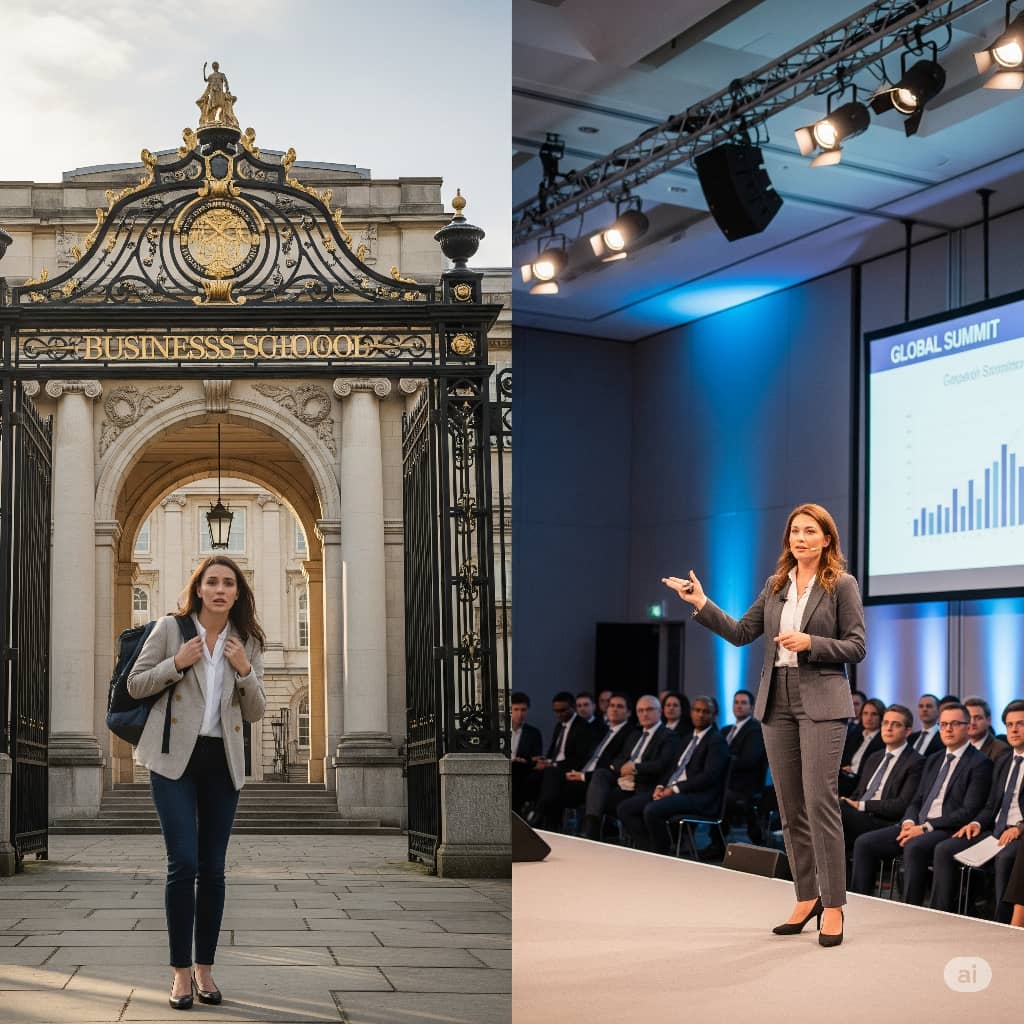Beyond the brand recognition, top MBA programs offer unparalleled opportunities. Discover how elite business schools provide career-transforming advantages that extend far beyond the classroom. I’ll always remember the moment a Fortune 500 CEO visited our campus for what I assumed would be a standard lecture. Instead, he spent thirty minutes critiquing our case study solutions, then invited the entire section to shadow his executive team for a week. This wasn’t exceptional at my program; it was typical. Attending a top-ranked MBA isn’t just about earning a degree; it’s about gaining access to a rarefied ecosystem where opportunities materialize that most professionals never encounter in their entire careers.
The recruiting pipeline at elite programs operates differently. Major consulting firms, investment banks, and tech giants allocate the majority of their MBA hiring budgets to target schools, creating a recruitment conveyor belt that removes countless barriers. I watched classmates land interviews through on-campus processes that would have required Herculean networking efforts from lower-ranked programs. The career center at my school had direct lines to alumni who were now hiring managers, enabling referrals that bypassed traditional application black holes. One classmate secured her dream job through a coffee chat the school arranged with an alum who happened to be the SVP of Talent at a FAANG company, a connection nearly impossible to access through cold outreach.
The caliber of peers reshapes your professional trajectory permanently. My study group included a former Olympic athlete, a startup founder who sold her company for eight figures, and a Navy SEAL. These weren’t just impressive resumes, they were living case studies in leadership, resilience, and unconventional thinking. The midnight debates in our dorm common areas about market strategies or ethical dilemmas often proved more valuable than daytime lectures. Years later, this network continues paying dividends; when I considered pivoting to venture capital, three classmates who’d become investors immediately set up informationals with their firms.
Top programs attract faculty who shape global business practices. My pricing strategy professor literally wrote the textbook used worldwide. The negotiations instructor consulted on billion-dollar mergers between classes. This proximity to thought leadership creates unique opportunities. I contributed research to a professor’s HBR article that became my go-to credential during consulting interviews. Unlike lower-ranked programs where professors focus primarily on teaching, elite school faculty often integrate students into groundbreaking work; one classmate co-authored a fintech paper with our adjunct professor, a sitting Federal Reserve board member.
The alumni network functions like a professional GPS system. When I explored expanding my business to Asia, the alumni directory connected me with graduates in seven cities who offered market insights no consultant could provide. The brand recognition opens doors unexpectedly during a chance meeting at an airport, a stranger noticed my school’s logo on my laptop and spent the flight introducing me to his private equity contacts. This pervasive network creates career insurance; during economic downturns, top-school alumni receive first consideration for “hidden” opportunities never publicly posted.
Access to cutting-edge resources accelerates innovation. Our entrepreneurship center provided prototyping labs with 3D printers and legal clinics for patent filings. The investment fund allowed students to manage real capital, my team’s healthcare sector bets outperformed the S&P by 14% that year. These aren’t theoretical exercises but resume-builders with tangible outcomes; the student-run VC fund at my school has seeded multiple unicorns, with participants getting preferential hiring at partnered firms.
Global immersion happens differently at elite levels. While most programs offer study abroad, top schools establish exchange programs with peer institutions where you’re learning alongside future ministers and Fortune 500 successors. My semester at a European business school included dinners with central bank governors and factory tours led by fourth-generation family business scions, experiences curated through decades of institutional relationships. These global connections later helped me navigate cross-border negotiations with cultural fluency most competitors lacked.
The credential carries compounding value throughout your career. Early on, it gets you interviews. Mid-career, it facilitates transitions, I’ve watched alumni pivot from operations to investing to entrepreneurship with credibility others must earn through longer proving periods. At senior levels, it becomes a shared language; boardroom conversations often reveal unspoken bonds between executives from rival firms who discover they sat in the same classrooms decades apart.
Critics argue that the core curriculum differs little across tiers, but they miss how elite programs transcend academics. The case discussions are enriched by students who’ve actually led companies through similar challenges. Guest lecturers aren’t local executives but sitting CEOs and Nobel laureates. Campus recruiting includes roles created specifically for the school’s talent pipeline. Perhaps most importantly, the brand becomes a permanent endorsement when presenting to clients, my degree subtly signals analytical rigor and strategic thinking before I speak a word.

Five years post-MBA, the advantages continue unfolding. Alumni events connect me to industry leaders who become clients. The school’s research informs my strategic decisions through proprietary briefings. Most unexpectedly, the shared experience creates instant rapport with counterparts—a negotiation that stalled for months suddenly progressed when the other side noticed my school’s alumni pin on my jacket.
Attending a top program isn’t about elitism, it’s about accessing a platform that amplifies every subsequent career move. The lectures fade, but the network, the brand halo, and the transformed mindset endure. That CEO who invited us to shadow his team? He later hired three classmates into C-suite track positions. At a top MBA, such opportunities aren’t exceptions, they’re the expected return on your investment.
References
Unimy. (2025, January 30). How an MBA impacts career growth after 5-10 years. Retrieved August 2, 2025, from https://www.unimy.com/article/mba-careers/how-an-mba-impacts-career-growth-after-5-10-years
Wharton School, University of Pennsylvania. (2023, August 8). Why get an MBA: Benefits & advantages. Retrieved August 2, 2025, from https://mba.wharton.upenn.edu/why-get-an-mba/
Webber International University. (2025, January 22). Is an MBA degree worth it? Benefits of MBA: A detailed look. Retrieved August 2, 2025, from https://www.webber.edu/is-mba-degree-worth-it/
Master’s Portal. (2025, June 11). 10 very good reasons to do an MBA degree. Retrieved August 2, 2025, from https://www.mastersportal.com/articles/340/10-very-good-reasons-to-do-an-mba-degree.html

